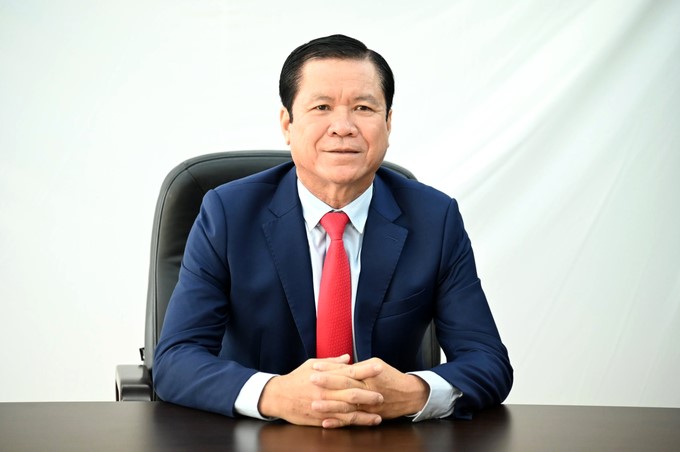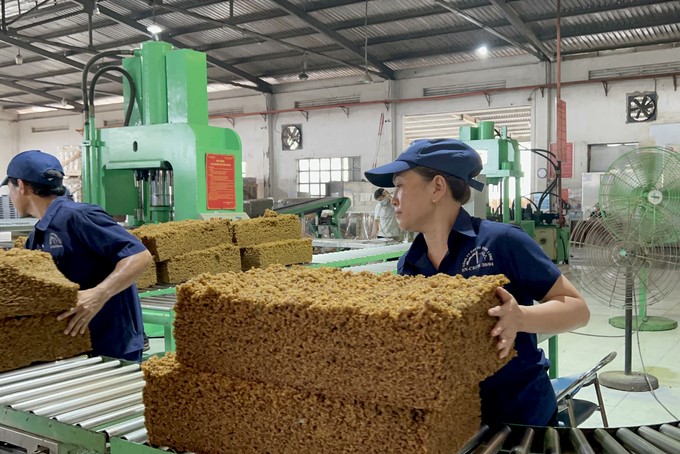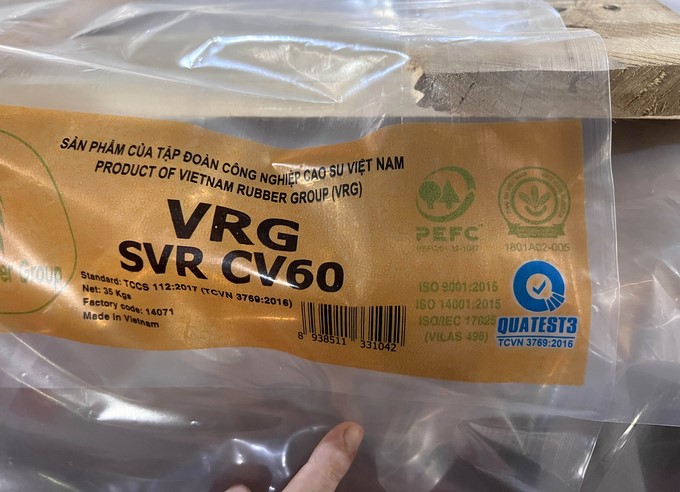June 14, 2025 | 03:33 GMT +7
June 14, 2025 | 03:33 GMT +7
Hotline: 0913.378.918
June 14, 2025 | 03:33 GMT +7
Hotline: 0913.378.918
Discussing sustainable development of the rubber industry, Vietnam Agriculture News had an exchange with Mr. Le Thanh Hung, General Director of Vietnam Rubber Group.

Mr. Le Thanh Hung, General Director of Vietnam Rubber Group. Photo: Thanh Son.
Dear sir, what has motivated the Group to go into sustainable development?
In recent years, sustainable development has been recognized as the inevitable path of humanity, of Vietnam in general, and of the rubber industry in particular. Sustainable development is also an inevitable choice for any company if it wants to survive and develop in this period of international integration. In the modern market economy, sustainable companies are not only a recommendation but also a mandatory requirement in international trade.
Vietnam Rubber Group (VRG) is a large company that is deeply integrated into the international economy. The group's leaders have clearly realized that the role and responsibility of a sustainable company are associated with three aspects: economic development, environmental protection, and responsibility to the community and society. For that reason, since 2018, the Group’s administrative council has issued a resolution on sustainable companies. The Administrative Council also issued a decision on the sustainable development program for the 2019–2024 period, with 10 goals in the three above-mentioned sustainable development aspects.
After four years of sustainable development, what results has the Group achieved so far, sir?
After four years of implementing the sustainable development program, VRG currently has 27 companies that have built plans for sustainable forest management, reaching approximately 276,000 ha. In which, 17 members were granted the Certificate of Sustainable Forest Management VFCS/PEFC-FM with over 109,000 ha of rubber forest. The PEFC-CoC chain of custody certificate has been granted to 31 rubber processing factories and two wood processing factories in the Group. In addition, in June 2022, the holding company, the Group, was granted a PEFC-CoC certificate by PEFC for merchants.
Especially in 2022, despite the difficult market, the whole Group has consumed more than 48 thousand tons of VFCS/PEFC certified latex at the request of customers, for which the product with VFCS/PEFC certification of the Binh Long Rubber Company has a different selling price compared to uncertified latex products.
Another outstanding result is that since VRG implemented the Sustainable Company Certification for its member companies in 2019, every year the Group has 10–20 units ranking in the Top 100 and 1-2 units ranking in the Top 10. In addition, the units also awarded bonuses for "Responsible Businesses on Human and Children's Rights" and "Gender Equality in Business”.
Over the years, the Group continued to implement the "Technical Plan on Zoning, Rehabilitating, and Conserving 5,000 ha of Forests in Cambodia" and develop over 3,400 ha of multi-purpose forest tree planting. VRG's sustainable development program also promotes activities related to social responsibility, environmental protection, enhancement of cleaner production solutions, reduction of greenhouse gas emissions, energy saving use, communication, training on sustainable development, ensuring workers' rights, and investing in social security.

Rubber latex processing at Binh Long Rubber Co., Ltd. Photo: Thanh Son.
Until now, the whole Group has had 34 units applying ISO 14001 and wastewater treatment systems meeting local requirements. The Group’s total solar rooftop capacity by the end of 2022 was 10,112 kWp, equivalent to reducing emissions by 10,321 tons of CO2/year. The total installed capacity of the Biomass steam boiler was 47 tons/hour, and the total output of processed latex using biomass technology reached over 48 thousand tons by the end of 2022.
The Group has maintained and expanded cooperation with many NGOs on sustainable development, such as Grow Asia, PanNature, WWF, PbN, etc. The most outstanding result is the cooperation with Oxfam in Vietnam and Oxfam in Cambodia to develop a "Handbook for Community Consultation and Engagement in Sustainable Rubber Forest Management" to apply in Vietnam and Cambodia.
Dear sir, has sustainable development helped the Group harmonize economic development with social responsibility and environmental protection?
When implementing projects, we always ensure the harmony of interests between businesses and people. With the consistent policy of sustainable development associated with environmental protection and social security, developing projects must ensure that people in the project area and surrounding areas benefit from the projects, create jobs, increase incomes, and improve people's lives in terms of culture, social security, and health care. In addition, the sharing of difficulties, gratitude, and community development are paid special attention to and carried out regularly and continuously in all areas where the dependent units operate.
For the rubber development investment program in Laos and Cambodia, we focus on preserving and promoting conservation values in the project areas with related activities and always comply with the laws of the home country and international conventions in the areas of operation. We give priority to creating jobs for the community around the project area, providing stable income for local people, and building houses for workers to share difficulties and help workers have a residential place, and building social security structures.
Besides, rubber projects in Laos and Cambodia have invested in building many social to serve people in and around the project area. Up to now, the total value of the Group's investments in social security projects has reached approximately USD 77 million in Cambodia and more than USD 8 million in Laos.
Moreover, rubber projects have contributed support to the locality to build or repair roads, bridges, schools, markets, local offices, forest protection houses, etc. Thereby strengthening good relationships and trust between businesses and the community, bringing infrastructure benefits to the project area, and providing a stable income for local workers. VRG is thus considered a very responsible company for society and the community.

Rubber products with the PEFC stamp of Phu Rieng Rubber Company. Photo: Thanh Son.
In the coming time, what goals does the Group set for sustainable development, sir?
VRG's sustainable development goal in the coming time is to expand a number of appropriate activities to meet the country's sustainable development goals committed to the United Nations’ Agenda to 2030 and comply with the national strategy on green growth for the 2021–2030 period with a vision to 2050.
Specifically, the group will promote the implementation of national and international certifications on sustainable management of rubber forests and processing factories, strengthen solutions to improve the value of certified products, and promote products with sustainable forest certification to customers. By the way, related to sustainable forest management, the Group proposes to the Ministry of Agriculture and Rural Development and relevant agencies to consider allowing rubber areas with certificates of sustainable forest management according to VFCS/PEFC-FM to enjoy forest environmental services.
At the same time, the Group will continue to implement sustainable company certification and sustainable development solutions such as planting forest trees and timber trees and integrating the GIS-VRG Project into sustainable forest management to increase the economic efficiency of sustainable development.
The Group will continue to strengthen the implementation of social responsibility, community connection, and environmental protection; strengthen communication and training on sustainable development; and expand cooperation with domestic and foreign organizations on sustainable development.
Thank you, sir!
Translated by Huyen Vu

(VAN) In Tien Giang, a high-tech shrimp farm has developed a distinctive energy-saving farming model that has yielded promising results.
![Turning wind and rain into action: [3] 300.000 farmers benefit from agro-climatic bulletins](https://t.ex-cdn.com/nongnghiepmoitruong.vn/608w/files/news/2025/06/12/e5a48259d6a262fc3bb3-nongnghiep-125122.jpg)
(VAN) The agro-climatic bulletin has become a valuable tool for farmers in the Mekong Delta. After more than five years of implementation, the initiative is gradually being expanded nationwide.
![Turning wind and rain into action: [2] Providing forecasts to the people](https://t.ex-cdn.com/nongnghiepmoitruong.vn/608w/files/news/2025/06/12/e5a48259d6a262fc3bb3-nongnghiep-103927.jpg)
(VAN) In addition to improving the quality of hydrometeorological forecasts, putting forecast bulletins into practical use is crucial for production and disaster prevention.

(VAN) Blue carbon is receiving attention for its rapid absorption capacity and vast potential. It represents a promising nature-based solution to respond to climate change.
/2025/06/11/3507-1-161904_583.jpg)
(VAN) Seagrass beds and coral reefs serve as 'cradles' that nurture life in the ocean depths, creating rich aquatic resources in Vietnamese waters.
![Turning wind and rain into action: [1] Forecasting for farmers](https://t.ex-cdn.com/nongnghiepmoitruong.vn/608w/files/news/2025/06/11/e5a48259d6a262fc3bb3-nongnghiep-111919.jpg)
(VAN) Weather is no longer just a matter of fate. Forecasts have now become an essential companion for farmers in every crop season.
/2025/06/10/2501-3-082025_983.jpg)
(VAN) Mr. Le Hoang Minh, Head of Vinamilk's Net Zero project, recently shared insights on the integration of production, energy, and technology in Vinamilk’s green transition journey.